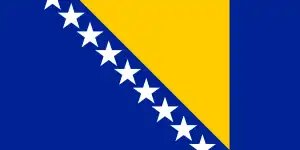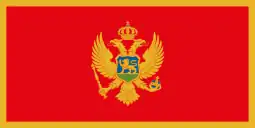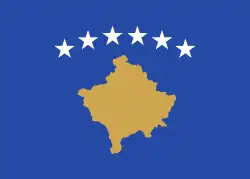| Medal record | ||
|---|---|---|
| Men's Basketball | ||
| Representing | ||
| FIBA Under-19 World Championship | ||
| 1987 Bormio | ||
The Yugoslavia men's national under-19 basketball team, commonly referred to as the Yugoslavia men's national junior basketball team (Serbo-Croatian: Mlada košarkaška reprezentacija Jugoslavije), was the boys' basketball team, administered by Basketball Federation of Yugoslavia, that represented SFR Yugoslavia in international under-19 (under age 19) men's basketball competitions, consisting mainly of the World Championship for Junior Men.
After the dissolution of SFR Yugoslavia in 1991, the successor countries all set up their own national under-19 teams. Serbia won the Championship in 2007.
Several members of the team have been inducted into the FIBA Hall of Fame, including players Vlade Divac, Jure Zdovc and Toni Kukoč and coach Svetislav Pešić, while players Divac, Kukoč, and Dino Rađa are members of the Naismith Memorial Basketball Hall of Fame.
In 2017, 250 Steps, a film about the 1987 gold medal, was released.
Individual awards
- Toni Kukoč — 1987
- Dejan Bodiroga – 1991
World Championship competitive record
| Year | Pos. | GP | W | L | Ref. |
|---|---|---|---|---|---|
| As | |||||
| 4th | 8 | 5 | 3 | [1] | |
| 8th | 9 | 3 | 6 | [2] | |
| 7 | 7 | 0 | [3] | ||
| 4th | 8 | 3 | 5 | [4] | |
| As | |||||
| did not qualify | [5] | ||||
| did not qualify | [6] | ||||
| did not qualify | [7] | ||||
| Total | 4/7 | 32 | 18 | 14 | |
Coaches
| Years | Head Coach | Assistant Coach(es) |
|---|---|---|
| 1979 | Luka Stančić | |
| 1983 | Rusmir Halilović | |
| 1987 | Svetislav Pešić | Dejan Srzić |
| 1991 | Duško Vujošević | Dejan Srzić, Kosta Jankov |
Players
| 1979 Championship | 1983 Championship | 1987 Championship | 1991 Championship |
|---|---|---|---|
| 4 Emir Mutapčić 5 Zoran Radović 6 Darko Petronijević 7 Davor Dogan 8 Milan Medić 9 Zoran Čutura 10 Željko Obradović 11 Žarko Đurišić 12 Đordano Baković 13 Goran Grbović 14 Milenko Savović 15 Sabahudin Bilalović |
4 Saša Radunović 5 Velimir Perasović 6 Franjo Arapović 7 Jure Zdovc 8 Zoran Jovanović 9 Dragan Lukenda 10 Nebojša Bukumirović 11 Goran Sobin 12 Danko Cvjetićanin 13 Ivica Mavrenski 14 Ivo Petović 15 Aleksandar Milivojša |
4 Zoran Kalpić 5 Luka Pavićević 6 Nebojša Ilić 7 Toni Kukoč 8 Miroslav Pecarski 9 Teoman Alibegović 10 Aleksandar Đorđević 11 Samir Avdić 12 Vlade Divac 13 Radenko Dobraš 14 Dino Rađa 15 Slaviša Koprivica |
4 Dejan Bodiroga 5 Petar Arsić 6 Nikola Lončar 7 Veljko Mršić 8 Gavrilo Pajović 9 Teo Čizmić 10 Željko Topalović 11 Željko Rebrača 12 Velibor Radović 13 Mlađan Šilobad 14 Dragan Tarlać 15 Zvonimir Ridl |
New national teams
After the dissolution of SFR Yugoslavia in 1991, five new countries were created: Bosnia and Herzegovina, Croatia, Macedonia (in 2019, renamed to North Macedonia), FR Yugoslavia (in 2003, renamed to Serbia and Montenegro) and Slovenia. In 2006, Montenegro became an independent nation and Serbia became the legal successor of Serbia and Montenegro. In 2008, Kosovo declared independence from Serbia and became a FIBA member in 2015.
Here is a list of men's national under-19 teams on the SFR Yugoslavia area:
 Bosnia and Herzegovina (1992–present)
Bosnia and Herzegovina (1992–present) Croatia (1992–present)
Croatia (1992–present) North Macedonia (1993–present)
North Macedonia (1993–present).svg.png.webp) Serbia and Montenegro (1992–2006)
Serbia and Montenegro (1992–2006)
 Montenegro (2006–present)
Montenegro (2006–present) Serbia (2006–present)
Serbia (2006–present)
 Kosovo (2015–present)
Kosovo (2015–present)
 Slovenia (1992–present)
Slovenia (1992–present)
See also
References
- ↑ "1979 World Championship for Junior Men". fiba.basketball. Retrieved 9 July 2018.
- ↑ "1983 World Championship for Junior Men". fiba.basketball. Retrieved 9 July 2018.
- ↑ "1987 World Championship for Junior Men". fiba.basketball. Retrieved 9 July 2018.
- ↑ "1991 World Championship for Junior Men". fiba.basketball. Retrieved 9 July 2018.
- ↑ "2003 World Championship for Junior Men". fiba.basketball. Retrieved 9 July 2018.
- ↑ "2003 World Championship for Junior Men". fiba.basketball. Retrieved 9 July 2018.
- ↑ "2003 World Championship for Junior Men". fiba.basketball. Retrieved 9 July 2018.
- ↑ "1979 Yugoslavia Junior team Roster". fiba.basketball. Retrieved 9 July 2018.
- ↑ "1983 Yugoslavia Junior team Roster". fiba.basketball. Retrieved 9 July 2018.
- ↑ "1987 Yugoslavia Junior team Roster". fiba.basketball. Retrieved 9 July 2018.
- ↑ "1991 Yugoslavia Junior team Roster". fiba.basketball. Retrieved 9 July 2018.